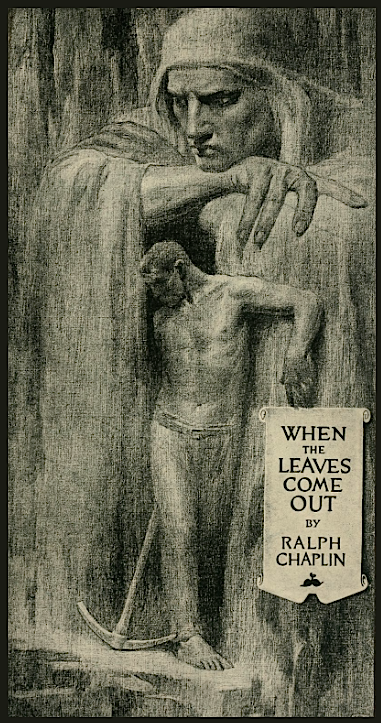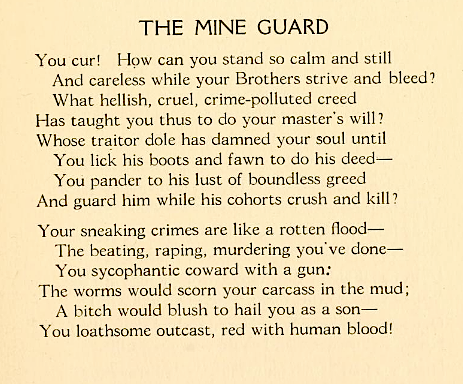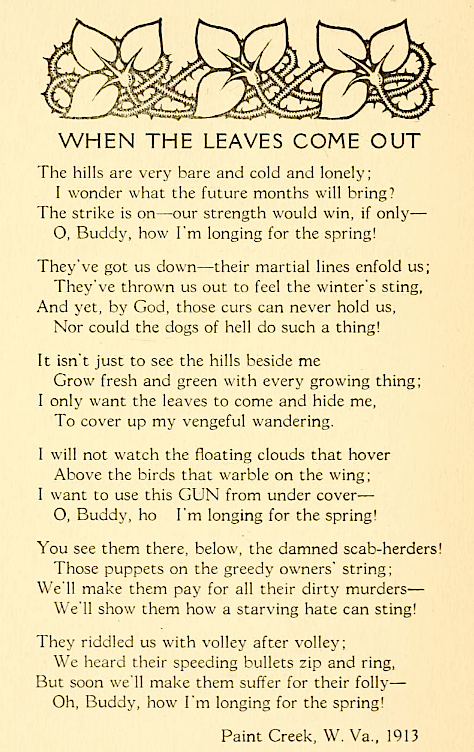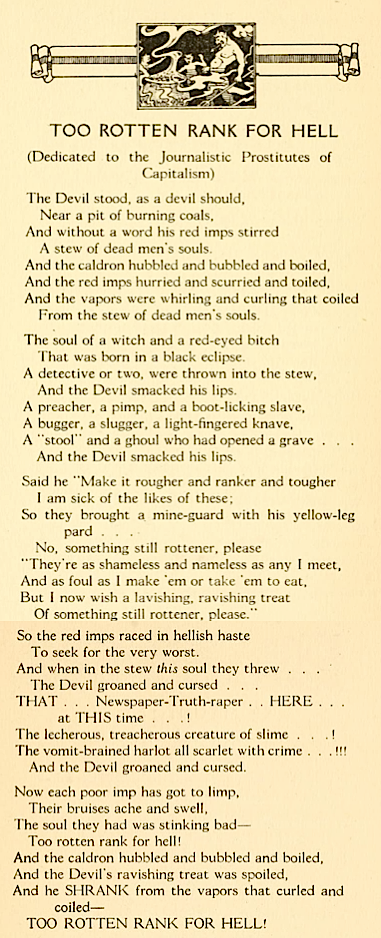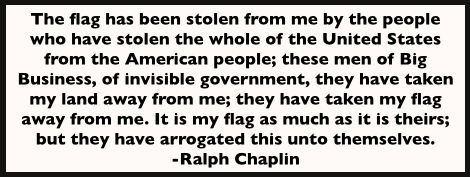
~~~~~~~~~~~~~~~~~~~~~~~~~~~~~~~~~~~~~~~~~~~~
Hellraisers Journal, Sunday July 28, 1918
Chicago, Illinois – Testimony of Ralph Chaplin
Report from Defendant Harrison George:
Ralph Chaplin, defendant, artist-poet, and editor of “Solidarity” during 1917, took the stand on the morning of July 19th, 1918, and gave an account of how his life’s events had influenced his conclusions upon industrial and political questions. Born in Kansas thirty years ago, he had studied art at night-school while working during the day-time in the darkroom, “Spot-knocking” photographs. Later, another boss, knowing he was a “scissor-bill,” had him pledge $10 a week out of a $16 wage to invest $500 in the boss’ business. When that was paid in, the boss told him to go to hell and got another victim. This $500 was recovered because Chaplin was a minor when the contract was made; so he took this and started into business for himself with the ambition to be “independent.” But—he found a trust controlled all supplies and he was unable to buy anywhere and had to quit. So he went back to the easel, working for wages.
He then went to Mexico for one year and noted the extreme poverty of the peon class under the Diaz regime. Coming back, he had worked for the Chicago Portrait Company until the artists struck against conditions there. When that strike was lost he went to West Virginia, where he did artist work in the coal mining region. For several years previous he had been an enthusiastic member of the Socialist Party, “soap-boxing” and writing articles.
In West Virginia he did much work on the “Socialist and Labor Star” at Charleston [Huntington], which paper became the spokesman for the U. M. W. of A. coal miners’ strike at Paint Creek and Cabin Creek. During this strike Chaplin acquired his hatred of the labor-crushing militia. He described to the jury the “Bull Moose Special,” an armored train, built by union machinists in the C. & O. shops, loop-holed for machine guns and rifles; a train that was manned by Baldwin-Felts detectives and commanded by Quinn Morton, a company superintendent, and in the darkness run through the strikers’ colony at Holly Grove, belching death to men, women and children.
Chaplin came out of that strike zone with undying hate for industrial tyranny. He had written many poems about that strike and Vanderveer read them to the jury: “What Happened in the Hollow,” “The Mine Guard,” “When the Leaves Come Out,” and “Too Rotten Rank for Hell.” The latter Vanderveer asked about. “Does it express your contempt for the prostitute newspaper men?” “Well,” said Chaplin, “a part of it.”
Chaplin told how the Socialists in West Virginia had won all the local elections during the strike, but were kept out of office by bayonets. He explained the I. W. W. attitude on violence and that sabotage was neither violence nor destruction, but the “black cat” an emblem of bad luck for the boss.
“Those who never work,” Chaplin said, glancing quickly at Nebeker, “do not know there is a class struggle.”
Referring to Nebeker’s allusion to sabotage as a “secret doctrine” Chaplin said, “Secrecy is not necessary; we want the whole world to know.”
In regard to the charge of “disloyalty,” etc., Vanderveer questioned Chaplin at some length.
VANDERVEER: You remember when militarism was first discussed here before we entered the war?
A. Oh, yes.
Q. Campaigning for it all over the country?
A. Yes.
Q. Did that arouse any special apprehension in your mind?
A. Yes, it did.
Q. Of what nature?
A. That the militaristic system would be built up in these United States by the powers of invisible government, similar to the militarism of Germany. In other words, that the American people, in spite of their spirit of freedom, would reach the stage here in these states and cities where a civilian would be brushed off the sidewalk by an officer in uniform and where the civilian population would have to kowtow to military rule all the time, and where military means would be used to keep the workers cowed and subjugated beneath the rule of the master class always. I saw that coming, or felt it coming.
Q. Did anything occur during the year of 1917 to confirm your fear?
A. Yes, indeed, a great many things.
Q. Where?
A. Well, the arrest of our boys by the militia. It was right in keeping with the things that have been hammered into me ever since I had the power to observe anything.
Q. Do you still believe that that use will be made of troops, for breaking strikes in this country?
A. I don’t see any reason why they should change now, unless there is some governmental power strong enough and clean enough to take hold. Wall Street wants it that way.
Q. What are your sentiments about the flag, Ralph?
A. Like everybody else, every American boy, at least, I was taught that the flag was the symbol of freedom. It was the symbol of things that my forefathers had lived for, fought for and died for; that the flag stood for American freedom; that this American freedom was different from the freedom in other countries and that the flag stood for it all.Chaplin said he had seen the flag used for other purposes—at Lawrence, Lowell—
Q. How about the Lumber Strike; the cry of patriotism throughout that? How did that affect you?
A. Well, it is the same thing. To my mind, the flag has been stolen from me by the people who have stolen the whole of the United States from the American people; these men of Big Business, of invisible government, they have taken my land away from me; they have taken my flag away from me. It is my flag as much as it is theirs; but they have arrogated this unto themselves. They say that the man who does not do as they want him to do is a traitor. But it is the ideas back of the flag that I particularly stand for. I say that this country now—I cannot see where this country now is the same, or has the same spirit it had back in 1776. In other words, I see this country now ruled by a profiteering gang. These men who say—“We are the government; we are the country; this is our flag,”—they will make you kiss it on the slightest provocation, assuming you are a traitor at heart, or that you are disloyal, when they themselves are coining their so-called patriotism into billions and billions of dollars.[Photograph added.]
“The Mine Guard” by Ralph Chaplin
“When the Leaves Come Out” by Ralph Chaplin
“Too Rotten Rank for Hell” by Ralph Chaplin
~~~~~~~~~~~~~~~~~~~~~~
SOURCES
The I.W.W. Trial
-Story of the Greatest Trial in Labor’s History
-by one of the Defendants
-by Harrison George
—-with introduction by A. S. Embree.
IWW, Chicago, 1919
https://catalog.hathitrust.org/Record/100663067
Pages 125-128: July 19, 1918 – Testimony of Ralph Chaplin
https://babel.hathitrust.org/cgi/pt?id=umn.31951d01368761a;view=2up;seq=126
Note: First ad I can find for this book:
Butte Daily Bulletin -page 3
-Mar 5, 1919
https://www.newspapers.com/image/176048912/
When the Leaves Come Out
and Other Rebel Verses
-by Ralph Chaplin
Cleveland, 1917
https://archive.org/stream/whenleavescomeou00chap#page/n5
IMAGES
Ralph Chaplin, Leaves, 1917
https://archive.org/stream/whenleavescomeou00chap#page/n1
Ralph Chaplin, Mine Guard, Leaves, 1917
https://archive.org/stream/whenleavescomeou00chap#page/30
Ralph Chaplin, Paint Creek 1913, Leaves, 1917
https://archive.org/stream/whenleavescomeou00chap#page/6
Ralph Chaplin, Rotten Rank, Leaves, 1917
https://archive.org/stream/whenleavescomeou00chap#page/18
See also:
“What Happened in the Hollow” by Ralph Chaplin
https://archive.org/stream/whenleavescomeou00chap#page/44
For more on the Huntington (WV) Socialist and Labor Star:
Gun Thugs, Rednecks, and Radicals:
A Documentary History of the West Virginia Mine Wars
-by David Alan Corbin
PM Press, Nov 1, 2011
(search: “history of the Socialist and Labor Star”)
https://books.google.com/books?id=cQYg1lPprF4C
For more on attack at Holly Grove Camp
by Bull Moose Special see testimony of Maud Estep:
Conditions in the Paint Creek District, West Virginia,
Hearings b/f Subcom of Com Ed and Lbr U. S. Senate, Sixty-third Congress, First Session Pursuant to S. Res. 37, a Resolution Authorizing the Appointment of a Committee to Make an Investigation of Conditions in the Paint Creek District, West
Virginia -Volumes 1, 2, 3 = Parts 1, 2, 3
Part 1: begins June 2, 1913
https://books.google.com/books?id=HQM9AAAAYAAJ
https://play.google.com/books/reader?id=HQM9AAAAYAAJ&printsec=frontcover&pg=GBS.PA1
Friday June 13, 1913 – Charleston WV
https://play.google.com/books/reader?id=HQM9AAAAYAAJ&printsec=frontcover&pg=GBS.PA430
PM Session
https://play.google.com/books/reader?id=HQM9AAAAYAAJ&printsec=frontcover&pg=GBS.PA455
Maud Estep
https://play.google.com/books/reader?id=HQM9AAAAYAAJ&printsec=frontcover&pg=GBS.PA460
~~~~~~~~~~~~~~~~~~~~~~~~~~~~~~~~~~~~~~~~~~~~
The Commonwealth of Toil – Joe Glazer
Lyrics by Ralph Chaplin
https://archive.org/stream/whenleavescomeou00chap#page/4

